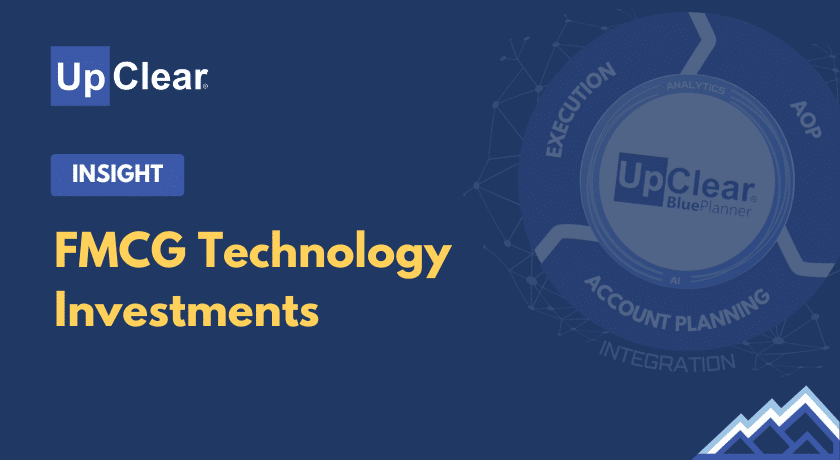By Ken Accardi & Julian Davies
Executive Summary: UK Focus
In the face of rising inflation, global uncertainty driven by US trade tariffs, potential European trade changes following recent discussions and rising UK grocery price competition, many UK consumer goods (CG) companies feel justified in delaying capital expenditures—particularly in cloud technologies, digital transformation, and SaaS platforms. However, just like their US counterparts, UK businesses risk long-term stagnation if they hit pause on capability investments.
This adapted paper explores why CG firms operating in the UK should treat digital capability not as a luxury for stable times, but as a strategic necessity—especially amid economic volatility, regulatory uncertainty, and tightening retailer dynamics.
The UK Climate: A Complex, Uncertain Landscape
The British CG industry faces several interwoven pressures:
- Potential changes to Post-Brexit trade barriers & customs complexity: Are more changes imminent? Changes to UK-EU trade rules have created friction in import/export processes, especially for perishable or fast-moving consumer goods. The UK’s new Border Target Operating Model (BTOM) adds compliance costs and delays. What, if anything, is going to change?
- Retailer power & margin pressure: The level of competition and role of price in grocery along with retailers dominant positions gives them leverage to push back on supplier price increases—similar to the US. This dynamic squeezes suppliers’ ability to pass on inflation-related costs. Who will ultimately fund the consumer price?
- Rising inflation & wage pressures: UK inflation, remains elevated for food, transport, and logistics. National Living Wage increases are compounding cost pressure for manufacturers and distributors alike.
- Labour shortages & supply chain disruption: From HGV drivers to warehouse operatives, staffing challenges have increased operating costs and made forecasting more complex.
- Regulatory uncertainty: Ongoing changes to UK-specific labelling, environmental standards (e.g. Extended Producer Responsibility), and HFSS (high fat, salt, sugar) rules make agility more essential than ever.
CFO Insight
Operational Efficiency as a Hedge Against UK-Specific Risks
For CFOs navigating UK-specific cost volatility, the message is clear: delay is expensive.
Key takeaways for UK CFOs:
- Regulatory-driven costs will increase: Efficient, compliant systems for labelling, tracking, and sustainability reporting reduce risk and cost.
- Better forecasting = Better resilience: SaaS tools that improve trade spend visibility, demand forecasting, and scenario modelling allow faster adaptation to retailer demands and shifting consumer trends.
- Sterling volatility and import costs: ERP and supply chain tech can help better model and manage foreign exchange exposure and procurement risk.
CEO Insight
Capability is the New Competitive Edge in the UK
UK CEOs must lead not just through caution, but through strategic investment in agility.
Key CEO considerations:
- SaaS enables scale without over-commitment: With tighter capital controls and more scrutiny from boards, modular SaaS solutions let CEOs scale technology spending in line with performance.
- Investor signals matter: Whether AIM-listed or private equity-backed, companies investing in operational improvement signal stability, foresight, and resilience.
- UK retail market volatility rewards fast movers: Better data allows CG brands to act faster on shopper trends, inflation-driven range resets, and promotional pivots.
CCO Insight
UK Retail Dynamics Demand Smarter Trade Spend
The UK retail environment is price-sensitive, promotion-heavy, and increasingly data-driven.
Key takeaways for UK CCOs:
- Price wars are intensifying: With Aldi and Lidl gaining share, national retailers are demanding greater promotional support—but not always with transparency or ROI accountability.
- HFSS and promotional limitations: Regulations on food promotion in certain categories make it essential to optimise every pound of trade spend using data and attribution tools.
- Collaboration is mission-critical: TPM (Trade Promotion Management) platforms foster alignment across finance, sales, and marketing—particularly critical when UK retailer demands change quickly.
What Happens if UK FMCG Firms Stand Still?
The risks are real:
- Eroded Margins: Inefficiency becomes structural as costs are absorbed instead of optimised.
- Lost Ground to Disruptors: UK startups and challenger brands using modern SaaS stacks are gaining agility and shelf space.
- Burnout & Talent Drain: With fewer people doing more work, retention becomes a tech-enabled issue.
- Transformation Backlog: Delaying investment today could mean having to overhaul operations under pressure tomorrow.
Conclusion: Invest with Purpose in the UK Context
UK consumer goods companies should not mistake prudence for paralysis. In times of inflation, supply risk, and regulatory change, investing in digital capability is a proactive hedge—not a speculative bet.
Tariffs may change. The political landscape may shift. But one constant remains: the need for data-driven decision-making and cross-functional alignment.
The real question for UK CG leaders isn’t: “Can we afford to invest now?”
It’s: “Can we afford not to?”
For more detailed insights and understanding, contact UpClear
About UpClear
At UpClear, our mission is to empower Consumer Goods brands to maximize revenue performance and trade investment returns through intelligent, collaborative software—providing a single source of truth, streamlined automation, and actionable insights.
BluePlanner Revenue Management software supports end-to-end processes, from Annual Operating Planning to Account Planning and Execution.





